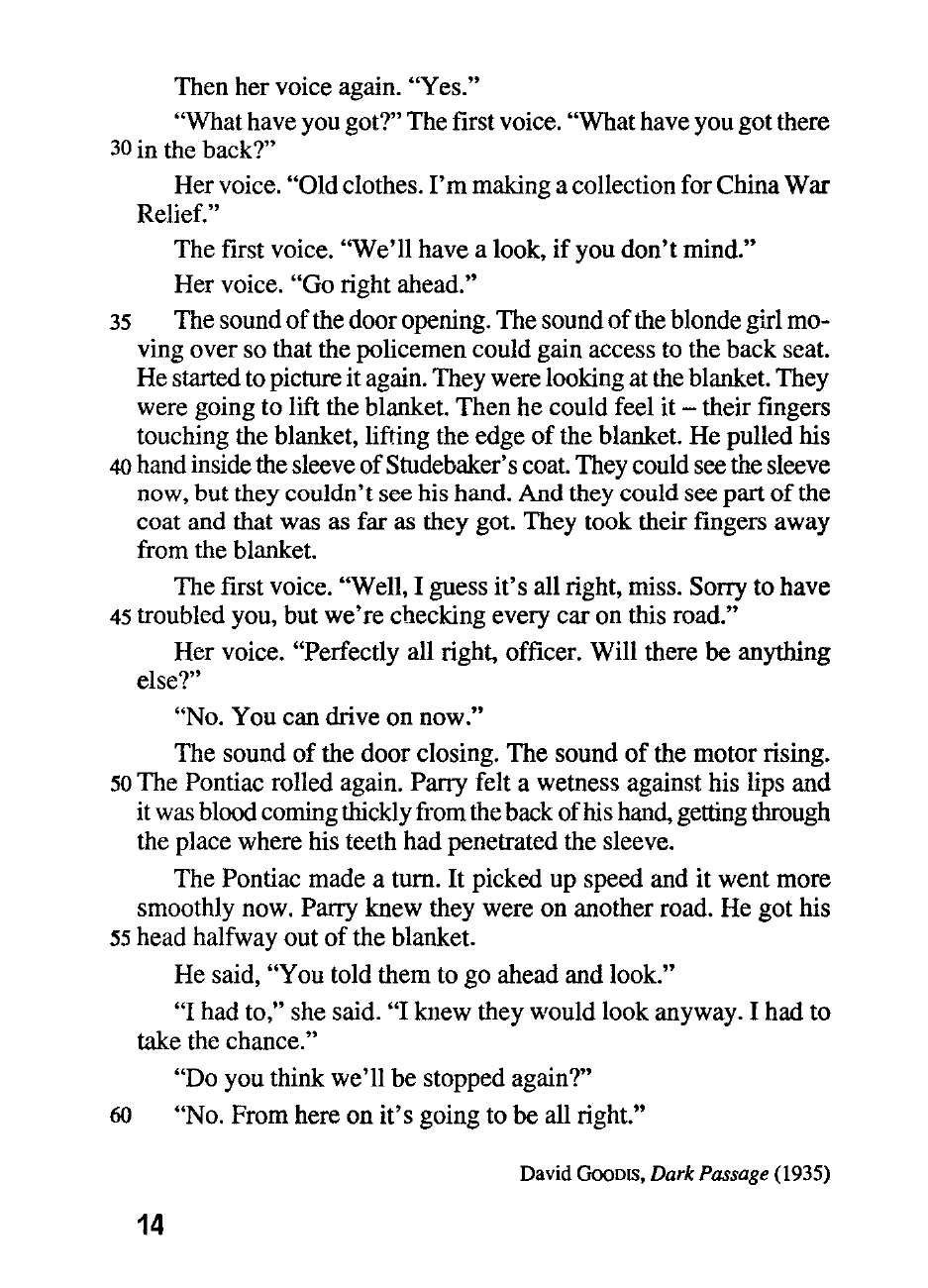SUJET NATIONAL, SESSION DE JUIN 1995 LANGUE VIVANTE 1- SÉRIES ES/S
Publié le 10/08/2014

Extrait du document

SUJET 1
1. Compréhension de l'écrit
Lisez très attentivement le texte ci-dessous.
The Pontiac was doing forty. It made a turn and Parry felt a sud-den decrease in speed. Then he heard the sound of motors — sharp little motors — motorcycles. His body started to shake. He tried to stop the shaking. He bit deep into the back of his hand. The mo‑
5 torcycles were coming from up front, closing in, getting louder. The Pontiac went down to twenty — fifteen — it was going to stop.
He could hear her saying, "Don't move, Vincent. Don't make a sound. It's going to be all right."
The Pontiac stopped. The sound of motorcycles came close, broke
10 like big waves nearing a beach, then became little waves coming up on the beach. The motorcycles were idling now. Parry pictured them parked at the side of the road. All he could see was the black inside of the blanket that was even blacker than the inside of the barrel. And yet he got his mind past the blanket and he could pic‑
15 ture the police walking over to the parked Pontiac.
Then he didn't need to picture it any more because he was hea-ring it.
A motorcycle policeman said, "Got your licence, miss?"
He could hear the sound of a panel compartment getting ope. 20 ned. He begged himself to stop the shaking.
"Where are you going, miss?" The same voice.
"San Francisco."
"I see you live there." The same voice.
"Yes." It was her voice. "What' s the matter, officer? Have I done 25 something wrong?"
"I don't know yet, miss." The same voice. Then another voice. "Carrying anything?"
13
Then her voice again. "Yes."
"What have you got?" The first voice. "What have you got there
30 in the back?"
Her voice. "Old clothes. I'm making a collection for China War
Relief."
The first voice. "We'll have a look, if you don't mind."
Her voice. "Go right ahead."
35 The sound of the door opening. The sound of the blonde girl mo-ving over so that the policemen could gain access to the back seat. He started to picture it again. They were looking at the blanket. They were going to lift the blanket. Then he could feel it — their fingers touching the blanket, lifting the edge of the blanket. He pulled his
40 hand inside the sleeve of Studebaker's coat. They could see the sleeve now, but they couldn't see his hand. And they could see part of the coat and that was as far as they got. They took their fingers away from the blanket.
The first voice. "Well, I guess it's all right, miss. Sorry to have 45 troubled you, but we're checking every car on this road."
Her voice. "Perfectly all right, officer. Will there be anything else?"
"No. You can drive on now."
The sound of the door closing. The sound of the motor rising. 50 The Pontiac rolled again. Parry feit a wetness against his lips and it was blood coming thickly from the back of his hand, getting through the place where his teeth had penetrated the sleeve.
The Pontiac made a turn. It picked up speed and it went more smoothly now. Parry knew they were on another road. He got his 55 head halfway out of the blanket.
He said, "You told them to go ahead and look."
"I had to," she said. "I knew they would look anyway. I had to take the chance."
"Do you think we'll be stopped again?"
60 "No. From here on it's going to be all right."
David GOODIS, Dark Passage (1935)
14
1. How many characters are there in the passage? Give their naines and first naines when possible. If not, write the way they are referred to in the text.
2. Who says:
1.22 "San Francisco".....................................................
1.27 "Carrying anything?"..............................................
1.29-30 "What have you got there in the back?"...............
1.34 "Go right ahead"....................................................
3. Explain in your own words: L l'elbe Pontiac was doing forty"
The.......... was...................................
4. Whose point of view is adopted in the main scene?
5. Say, in your own words, where the man ("lie") is located.
6. Give five details showing the consequences it has on the way the scene is described.
7. What do the underlined elements refer to?
1.1
1.3 > body started to shake............................................
L7 He could hear
1. 11-12 Parry pictured tljfin parked at the side of the road.

«
Tuen her voice again.
"Y es."
"What
have you got?" The first voice.
"What have you got there
30 in the back?"
Her voice.
"Old clothes.
I'm making a collection for China War
Relief."
The first voice.
"We'll have a look, if you don't mind."
Her voice.
"Go right ahead."
35 The sound of the door opening.
The sound of the blonde girl mo-
ving over so that the policemen could gain access to the back seat.
He started to picture it again.
They were looking at the blanket.
They
were going to lift the blanket.
Then
he could feel it -their fingers
touching the blanket, lifting the edge
of the blanket.
He pulled his
40 hand inside the sleeve of Studebaker' s coat.
They could see the sleeve
now, but they couldn't see his hand.
And they could see part
of the
coat and that was as far as they got.
They took their fingers away
from the blanket.
The first voice.
"Well, 1 guess it's all right, miss.
Sorry to have
45 troubled you, but we're checking every car on this road."
Her voice.
"Perfectly all right, officer.
Will there be anything
else?"
"No.
You can drive on now."
The sound of the door closing.
The sound of the motor rising.
50 The Pontiac rolled again.
Parry felt a wetness against his lips and
it was blood comingthicklyfrom the back ofhis
hand, getting through
the place where his teeth had penetrated the sleeve.
The Pontiac made a tum.
It picked up speed and it went more
smoothly now.
Parry knew they were on another road.
He got his
55 head halfway out of the blanket.
He said, ''You told them to go ahead and
look."
"I had to," she said.
"I knew they would look anyway.
1 had to
take the
chance."
"Do
you think we'll be stopped again?"
60 "No.
From here on it's going to be all right."
David Gooois, Dark Passage (1935)
14.
»
↓↓↓ APERÇU DU DOCUMENT ↓↓↓
Liens utiles
- SUJET NATIONAL, SESSION DE JUIN 1995 LANGUE VIVANTE I
- ANTILLES — GUYANE, SESSION DE JUIN 1995 LANGUE VIVANTE 1- SÉRIES L ET ES/S
- SUJET NATIONAL, SESSION DE JUIN 1995 LANGUE VIVANTE 2 - SÉRIE L
- ÉTRANGER — GROUPE 1, SESSION DE JUIN 1995 LANGUE VIVANTE 1- SÉRIES L ET ES/S
- ÉTRANGER-GROUPE 2*, SESSION DE JUIN 1995 LANGUE VIVANTE I


